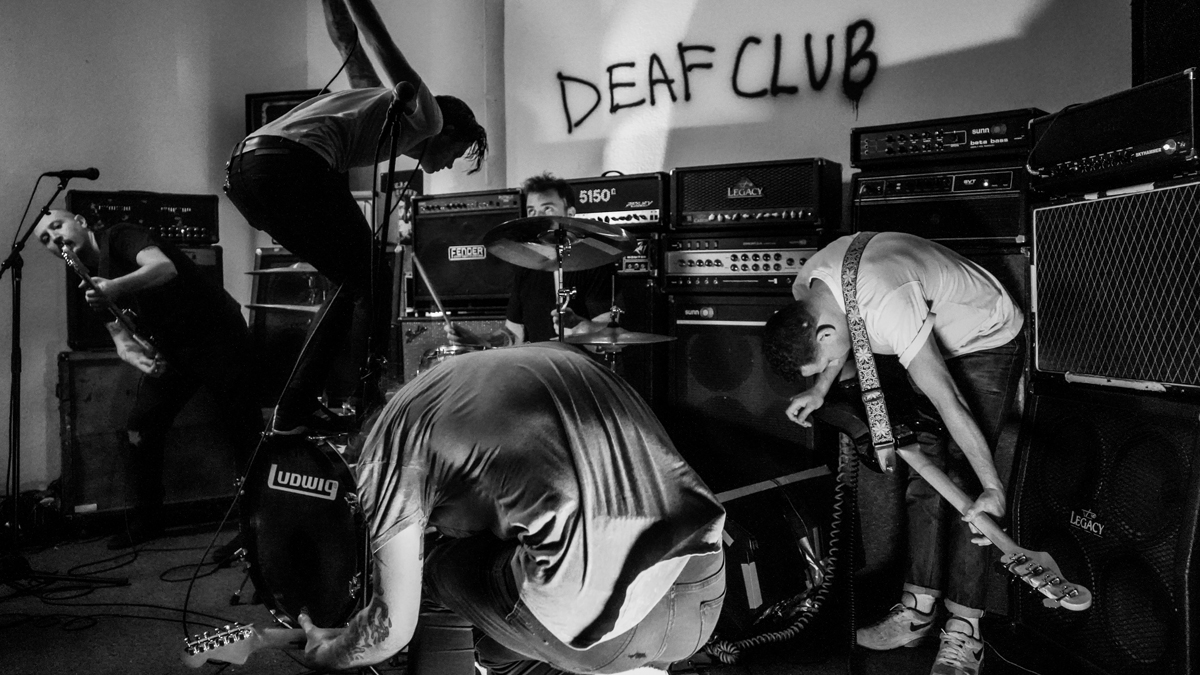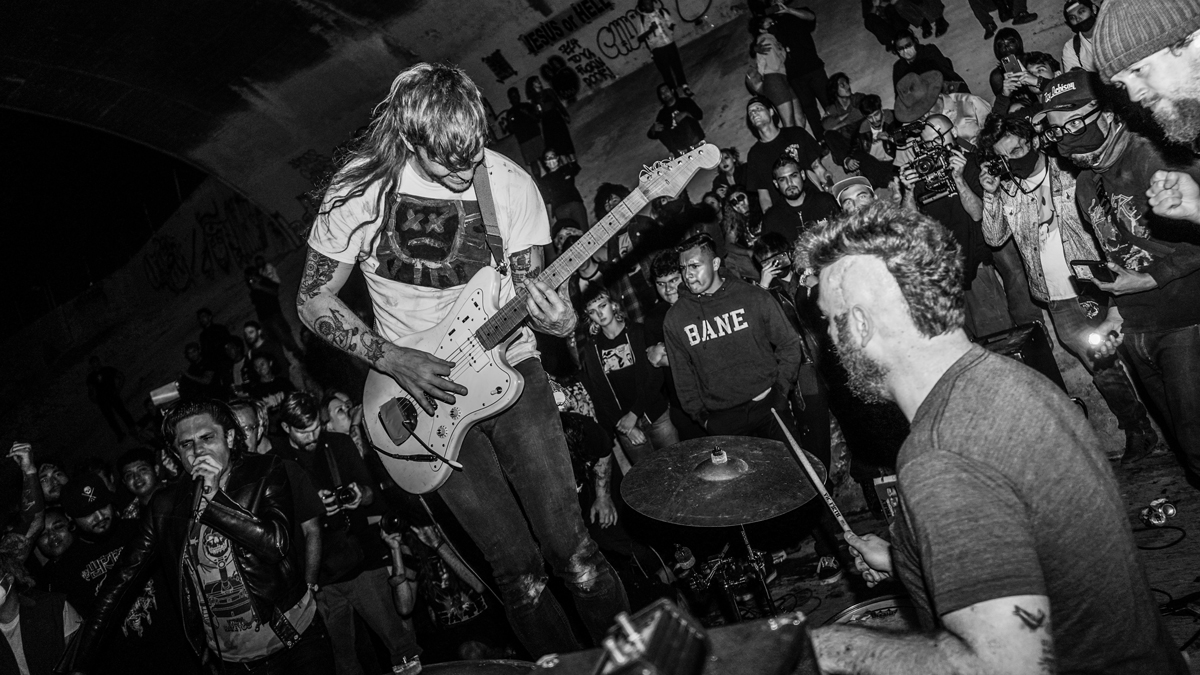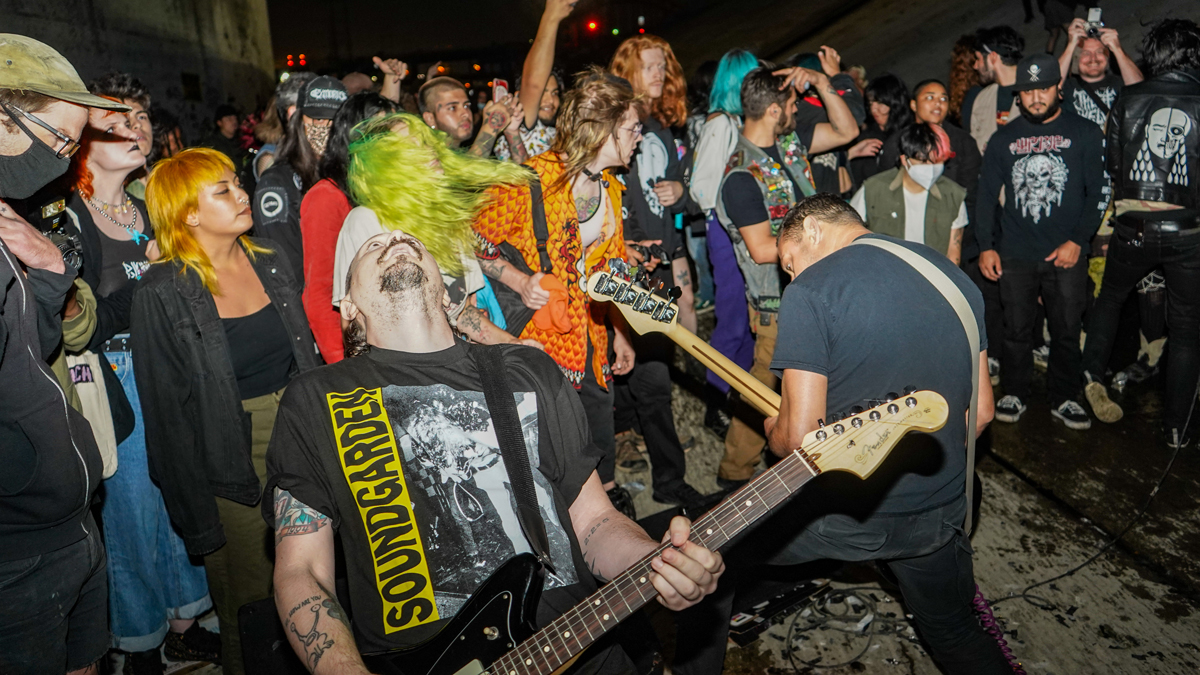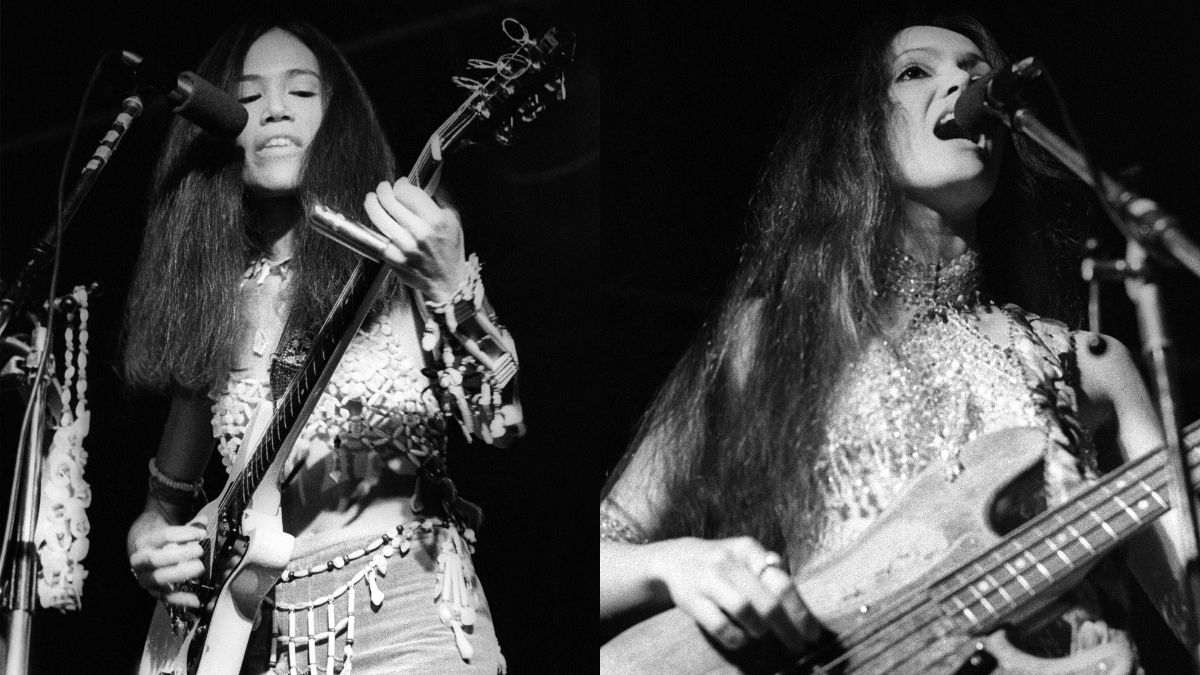Deaf Club: "We have a little language as far as chord voicings go – they’re definitely anxious chords!"
Tommy Meehan and Brian Amalfitano dish on their unique brand of pedalboard nastiness, covering the Pixies, and their shared love of ring modulators

All the latest guitar news, interviews, lessons, reviews, deals and more, direct to your inbox!
You are now subscribed
Your newsletter sign-up was successful
You get the sense through the effects-warped punishment of Deaf Club’s new Bad Songs Forever EP that guitarists Tommy Meehan and Brian Amalfitano are a pair of pedal obsessives. Check the way the duo bleed delay-and-octaver-decayed dissonance through If You Eat a Rat, It Might Taste Good, or take Pixies’ punk-ish Broken Face into sci-fi territory with its galaxy of uncouth guitar noises.
Fittingly enough, the guitarists dish on a wide swathe of stompboxes they brought to the release when Guitar World reaches them over Zoom. This includes tone-bending DigiTech Whammy Ricochets, the eyebrow-singing simplicity of fully-cranked Tube Screamers and Turbo RATs, and the customized, Deaf Club logo-encased Gojira Fx feedback loopers Amalfitano gifted the rest of the band a while back.
But while the record features an outright ripper called But Does It Fart?, neither member was compelled to break out the raspberry-blasting impracticality of Steve Gadlin’s Fart Pedal for the session.
“Brian and I each have one of these now,” Meehan says with a laugh of the gag-inducing effects pedal. “There’s no dynamics; it just switches through samples of farts.”
“There are definitely pedals on our ’boards that are one-trick ponies,” Amalfitano concedes. “We’ll just buy ridiculous things and be like, ‘Let’s see what the hell this does!’ I [also] want Tommy and I to get into pedal-making one day – create our own company and just be ridiculous with it.”
2019’s Contemporary Sickness EP and this past January’s Productive Disruption were panic-inducing frissons of power-violence and off-kilter hardcore savagery. The newly delivered Bad Songs Forever perhaps takes a more dynamic, though nevertheless nasty approach. While still possessing its share of bpm-pushing blasts, the band likewise expand the parameters by hanging onto haunted, spacious grooves.
“Everything had more of a chance to breathe,” Meehan suggests. “It’s more spaced-out, rhythmically. The guitar tones [are] living their full lives, versus being crammed into these little frenetic spaces.”
All the latest guitar news, interviews, lessons, reviews, deals and more, direct to your inbox!
Speaking with Guitar World, Amalfitano and Meehan weighed in on harmonizing ring mods, their go-to effects, and how they’re harnessing a gnarly, if more controlled kind of chaos on Bad Songs Forever.
When did you realize that you wanted to pull back from the nonstop attack of Productive Disruption?
Brian Amalfitano: “We were all trying to find our lane [on the earlier records], and were constantly making noise at the same time. It might’ve been a little overwhelming on the brain.
“When we had done the Killing Joke cover, The Wait [in 2020], we realized we could do a four-minute song and still sound brutal, [in part] with all these effects that Tommy and I incorporate. That gave it space to breathe. It sounded insane, but not indecipherable.
When I started playing with Brian it was like, ‘Oh shit, we think and speak the same language’
Tommy Meehan
“Also, just logistically, when you’re in a band like this and someone asks you, ‘Hey, can you play for 30 minutes?’ You’re like, ‘Well… that’s 35 songs! [laughs]. You start going, ‘Wait a minute – I should write a song that’s two minutes long.’ There should be these parts where Scott [Osment], our drummer, can chill out for a little bit and play some floor tom beats, and not have to blast for 40 seconds.”
How did that mindset translate to a song like the new EP’s If You Eat a Rat, It Might Taste Good, where you really drill into this darker, dirge-like groove?
Amalfitano: “Tommy and I have a little language in Deaf Club, as far as the chord voicings go, and it creates anxiety. They’re definitely anxious chords – things that don’t resolve, as well. I’m a fan of tritones, [so] I would just take the octave and flatten it down to create tension.
Meehan: “When I started playing with Brian it was like, ‘Oh shit, we think and speak the same language.’ I’ve never met another guitar player that felt the same way that I did about the nastiness of, ‘I’m going to throw a ring mod on. It’s not necessarily tuned correctly, but it works!’

Amalfitano: “Sometimes we do weird chords that complement each other, but then we throw in effects and they ruin that. So sometimes we’ll play to the effects: ‘Does this chord work with this ring mod? [Can] an octaver do this?’ We find ways to cheat that chord. You can make it sound more complex and interesting than it [really] is.”
Meehan: “A lot of whammy bar, too. Just both of us going out of tune at the same time, making things wavy and uncomfortable.”
We have this DigiTech Whammy trick where [Tommy] rises the octave and I lower the octave, so we’re separating the signals even further while dive-bombing on our guitars
Brian Amalfitano
Amalfitano: “We have this DigiTech Whammy trick where he rises the octave and I lower the octave, so we’re separating the signals even further while dive-bombing on our guitars. It depends on the song [but] we find these sonic tricks to incorporate with each other.”
What are the go-to effects on your ’boards?
Meehan: “I use a Tube Screamer just for straight feedback – I’ll have that cranked and it’ll be like ‘reeeeer’ [laughs]. I have the Line 6 FM4, an Electro-Harmonix Micro POG, a Bananana. I just got the Death by Audio Apocalypse – it’s this super disgusting overdrive/fuzz.
“For my ring mods, I like to use the DOD Gonkulator and also the Way Huge Ringworm – though it’s broken and in pieces right now. I have a lot of fucking pedals, but I think Brian has five times the amount that I have.”
Amalfitano: “I also use a Way Huge Ringworm and the DOD Gonkulator. I have five delays – two of them are Boss delays: one I use just for glitches [and] a sample/hold. The Bananana effect is kind of a special trick that Tommy and I use for glitchy computer sounds, like a broken signal. We both use the DigiTech Whammy Ricochet. And I always have to have a Turbo RAT for that high-gain distortion.”

Meehan: “We use delays to self-oscillate and get some nasty, get-down-on-our-knees-and-use-our-hands stuff.”
Amalfitano: “He has a guitar solo where it’s just feedback and an oscillated delay, and [then he] slows it down.”
Theres that wild, mutated tremolo solo on But Does It Fart? – is that where you’re dropping to your knees?
Meehan: “Yeah, and then I have to stand back up and sing backups. It’s not great!”
“It was originally intended as a dual solo, [and] I was like, ‘I’ll take the first shreddy part.’ It kind of reminds me of Slayer – very atonal – and then it goes into this noise thing with a bright MXR delay. I did both [sections] for the recording, but I was like, ‘I’ll just get Brian to do the second half of the solo live so I can get ready to do my vocal part.’”
Amalfitano: “Tommy had done it as a filler solo, but we all loved the shit out of it. Like, that’s not going to change!”
Meehan: “I kind of cursed myself with that, but it’s all good. I can pull it off. It’s a good challenge.”
Can you get into why you chose to cover Pixies’ Broken Face?
Amalfitano: “Scott and I had always wanted to cover Pixies. He had [previously covered] it at backyard shows. You know, you learn some Pixies or Nirvana, all these things that we grew up with.
“It’s almost at the same BPM, maybe slightly faster, but the song seemed kind of punk anyways. Scott can really just lay down a punk beat. We added our guitar layers; that’s how we Deaf Club it up. It was kind of a mix of Melt Banana-sounding stuff on top of this basic punk stuff. The lyrics seemed esoteric and askew, and that seemed like it was in [vocalist] Justin [Pearson]’s lane as well. It just felt like it could be a Deaf Club song, in certain respects.
“With Pixies stuff, Joey [Santiago] has a lot of these jagged guitar riffs. They’re not necessarily the prettiest. There’s a lot of inspiration from Pixies for me, for sure.”
With the band being called Deaf Club, what amps are you pushing?
With Brian and I, I’m more of the shrill side, and Brian has more of a low-end dialled in. It works really well in terms of us complementing each other
Tommy Meehan
Amalfitano: “Mine is a Carvin Legacy, the first Steve Vai model. It’s got the Greenbacks in it. It’s super loud. I do have an OR100 Orange as well.”
Meehan: “With Brian and I, I’m more of the shrill side, and Brian has more of a low-end dialled in. It works really well in terms of us complementing each other.
“I got a three-channel Dual Rectifier when I was 14. That’s what I’ve used for 20 years or so, but I always wanted to get a new head. I was speaking with Matt Cronk from Qui – he’s kind of a gearhead – and he pointed [me towards] this company called Verellen, which was run by this dude Ben Verellen [ed. Ben stopped making amps in 2021, but currently plays bass in Helms Alee].
“There’s one he made called the Skyhammer, which I ended up finding used on Reverb. It’s a super simple, two-channel amp. I’ve got a 4x12 with that, and I’m also rocking my 4x12 that I bought when I was 14. I play in a couple of other bands, too, and sometimes I’ll run a dual-amp setup with an AB switch.”
Amalfitano: “I bought my amp when I was 13-14, too. I use it because it takes a beating. We typically mess them up pretty bad.”
- Bad Songs Forever sees release May 6 via ThreeOneG.
Gregory Adams is a Vancouver-based arts reporter. From metal legends to emerging pop icons to the best of the basement circuit, he’s interviewed musicians across countless genres for nearly two decades, most recently with Guitar World, Bass Player, Revolver, and more – as well as through his independent newsletter, Gut Feeling. This all still blows his mind. He’s a guitar player, generally bouncing hardcore riffs off his ’52 Tele reissue and a dinged-up SG.

